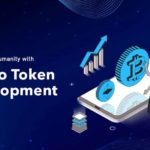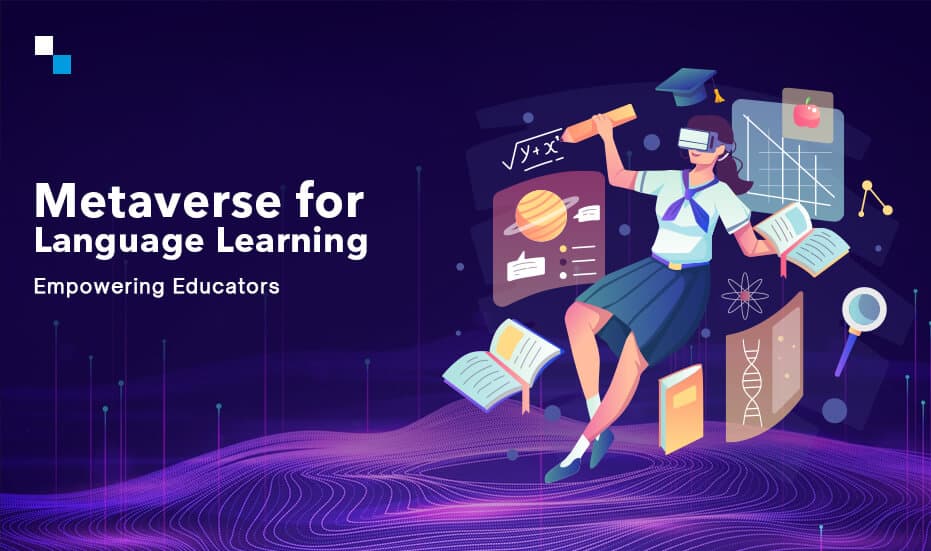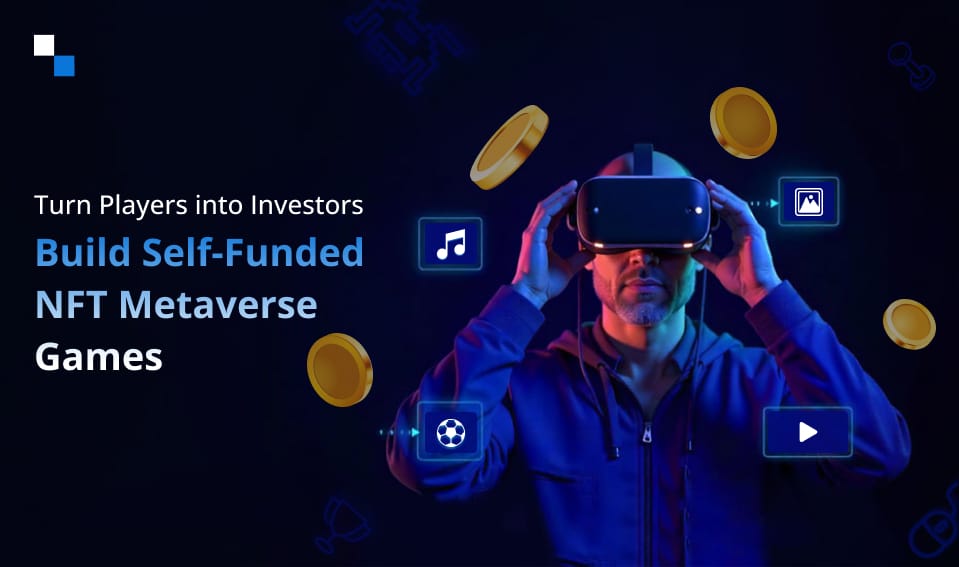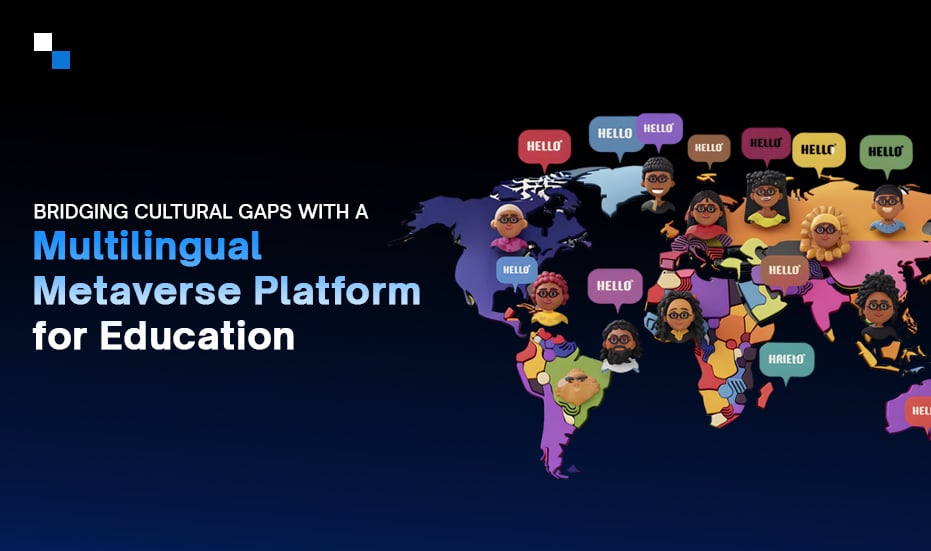
Crypto Token Development for Disaster Relief & Charitable Contributions: Empower Humanity
August 10, 2023
How to Develop an Advanced White-Label DeFi Wallet
August 11, 2023Foreign language learning has long been a cornerstone of education, empowering individuals to communicate across borders and embrace diverse cultures. It’s also necessary for international workers to learn the official language of the country to which they are going to migrate. However, the traditional methods of language instruction often face challenges in engaging learners and providing immersive experiences.
Enter the metaverse education platform, a revolutionary concept that merges virtual reality (VR) and augmented reality (AR) technologies to create interactive and dynamic language learning environments.
| “The number of users in the Metaverse Education market is predicted to reach 73.96 million by 2030. The value is estimated to expand at a 43.65% annual rate (CAGR 2023-2030), resulting in a market volume of US$24.00 billion by 2030.” |
The Current State of Language Learning
The current state of foreign language learning reflects a mix of traditional methods and emerging technologies. Language learning has become an essential skill in our interconnected world, enabling individuals to communicate, work, and interact across borders and cultures. Conventional language learning approaches often involve textbooks, language labs, and classroom instructions. While these methods have proven effective for many learners, they may face challenges in keeping students engaged and providing real-world language practice.
In recent years, digital tools and online platforms have begun to transform language education. Mobile apps, language learning websites, and virtual tutoring platforms offer learners greater flexibility and accessibility. Metaverse education platform development is a new concept for many. However, these digital solutions provide interactive exercises, gamified learning experiences, and personalized learning paths to cater to individual needs and learning styles.
Moreover, the global pandemic accelerated the adoption of remote language learning, with virtual classrooms and online language exchanges becoming commonplace. Language learners now have access to native speakers from around the world, enabling authentic language practice and cultural immersion.
As technology continues to evolve, and growing awareness about the metaverse platform for education, foreign language learning stands at a transformative juncture, with the potential to further bridge linguistic gaps and create a more interconnected world.
Metaverse Education Platform Development – Today’s Need
It’s time to explore the advantages of developing a metaverse platform for education that aims at foreign language learning. Let’s also discuss the challenges, and how Metaverse education platform development improves the potential to transform the way languages are taught and acquired.
Let’s find out how it makes a difference:
1. Create Immersive Learning Environments
Metaverse education platform offers a paradigm shift by immersing learners in interactive 3D environments. Learners can explore virtual worlds, interact with native speakers, and engage in real-life scenarios, enhancing their language skills in context-rich settings.
2. Authentic Language Use
Metaverse platform for education exposes learners to authentic language use, simulating real conversations, cultural experiences, and everyday situations. This exposure builds confidence and bridges the gap between classroom learning and real-world application.
3. Personalization and Gamification
Metaverse education platform development helps to leverage personalized learning paths and gamification elements to cater to individual learners’ needs and preferences. Learners can set goals, track progress, and receive instant feedback, promoting active participation and a sense of achievement.
4. Global Collaboration
Metaverse platforms enable learners to connect with peers worldwide, fostering cross-cultural interactions and encouraging language practice with speakers from diverse backgrounds.
Build your Metaverse education platform today!
Schedule Free DemoEssential Features of the Metaverse Education Platform For Language Learning
Here are some of the must-have features of a metaverse platform specially designed for language learning:
1. Virtual Language Labs
Metaverse language labs facilitate speech practice and pronunciation improvement through interactive exercises, voice recognition technology, and real-time feedback.
2. Language Avatars
Learners can create personalized avatars that interact with native-speaking virtual characters, providing a sense of immersion and encouraging conversational practice.
3. Cultural Exploration
When we speak about learning a foreign language through a metaverse platform for education it will be necessary to integrate cultural experiences, such as virtual city tours, historical reenactments, and culinary adventures, to promote cultural understanding alongside language learning.
4. Augmented Reality Language Practice
Some metaverse platforms incorporate augmented reality (AR) to superimpose language learning content into the real world, enabling learners to practice vocabulary in real-life contexts.
5. Social Learning Spaces
Virtual classrooms and language cafés offer learners a collaborative and supportive environment to practice language skills with peers and instructors.
Advantages of Metaverse Education Platform Development Foreign Language Learning
There are numerous benefits of developing a Metaverse education platform for foreign language learning. Some of them are mentioned below:
- Increased Engagement
The immersive and interactive nature of metaverse platforms captivates learners, increasing motivation and sustaining their interest in language learning.
- Contextual Learning
Learners acquire language skills in meaningful contexts, making connections between words, phrases, and cultural nuances.
- Continuous Practice
Metaverse platforms facilitate continuous language practice, enabling learners to reinforce their skills at their own pace and convenience.
- Confidence Building
Learners gain confidence in using the language through virtual role-playing and interactions, which reduces anxiety in real-world language use.
- Accessibility and Inclusivity
Metaverse platforms offer flexible learning options, making language education accessible to diverse learners, including those with physical or geographical limitations.
Challenges and Considerations
It isn’t as easy to do Metaverse education platform development as it sounds. Let’s understand how is it a challenging task:
- Technology and Infrastructure: A metaverse education platform requires robust technology and reliable internet connections, which may pose challenges for some learners, particularly in resource-constrained regions.
- Content Development: Creating high-quality and culturally relevant content for diverse language learning experiences requires extensive collaboration and expertise.
- Data Privacy and Security: Protecting learners’ data and ensuring safe online environments are critical considerations in metaverse education platform development.
- Integration with Curriculum: Integrating metaverse language learning into existing curricula may require adaptability and coordination among educators and institutions.
- Digital Literacy and Training: Supporting educators and learners in effectively using metaverse platforms demands digital literacy training and ongoing technical support.
All these challenges can be easily handled by experienced developers having deep knowledge and experience in blockchain and metaverse technologies, apart from the ability to stay in sync with the educators to make sure that all the necessary features and functionalities of the platform are included appropriately.
Unlock new linguistic horizons in the metaverse!
[widget id=”custom_html-3″]
Real-World Examples of Metaverse Language Learning Platforms
The integration of metaverse technology with language learning has opened up exciting possibilities for immersive and engaging educational experiences. As the world embraces virtual reality and augmented reality, language learners can now embark on their linguistic journey through interactive and culturally immersive platforms.
Here are the top five real-world metaverse language learning platforms that are revolutionizing the way we learn languages.
1. Rosetta VR
Rosetta VR offers a virtual reality language learning environment where learners can explore foreign landscapes and interact with native speakers. Through realistic scenarios and culturally diverse content, learners develop conversational skills and cultural understanding.
2. LingoLand
LingoLand combines augmented reality with language learning, allowing users to overlay vocabulary and grammar exercises onto real-world objects. With interactive lessons and gamified challenges, learners can practice in context-rich environments.
3. VRlingo
VRlingo offers a virtual language cafe where learners from around the world can interact with each other using their target language. Through role-playing and socializing in virtual environments, learners build confidence in their language abilities.
4. Babbleverse
Babbleverse creates a collaborative language learning space, connecting learners with native speakers through a virtual classroom setting. Learners can practice conversation, receive real-time feedback, and join group activities.
5. LanguageQuest VR
LanguageQuest VR takes learners on virtual language trips to explore famous landmarks and cultural sites. With language challenges and quizzes incorporated into the experience, learners have fun while improving their language skills.
Conclusion
Metaverse education platforms present an exciting frontier for foreign language learning, leveraging the power of virtual reality and augmented reality to transform traditional language education. The immersive and interactive nature of any metaverse education platform creates dynamic learning environments that promote contextual language use, cultural understanding, and global collaboration. As these technologies continue to evolve, a metaverse education platform can enhance the potential to revolutionize language acquisition, fostering confident, skilled, and culturally aware global communicators.
Antier can help educators and language learners to embrace this transformative approach, in which the metaverse stands ready to unlock the boundless possibilities of language learning. Contact us for Metaverse education platform development with a focus on teaching a foreign language.



